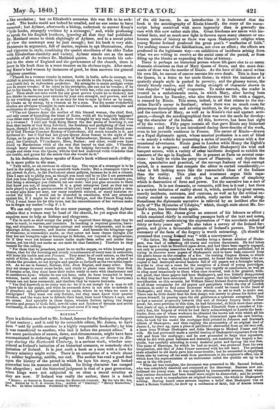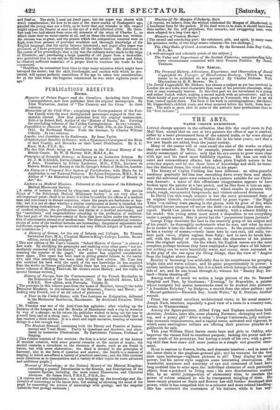Eizzio.* Tars is a fiction ascribed to Mr. Ireland, famous
for the Shaksperian forgery of last century ; and is said by its ostensible editor, Mr. James, to have been "sold by public auction to a highly respectable bookseller; by him
it was transferred to another, who laid it before the present editor. A few more particulars of names, dates, and circumstances, might have been communicated in deducing the pedigree : but Rizzi°, or Scenes in Eu- rope (luring the Sixteenth Century, is a curious work, whether con- sidered as Ireland's imitation of an historical romance, or somebody else's imitation of Ireland. It is just such a book as a man with a turn for literary mimicry might write. There is no conception of a whole about it; neither beginning, middle, nor end. The author has read a good deal upon the history of the period in which he lays his story, and looked somewhat into its manners and habits. Its living character has escaped bun altogether ; and the historical judgment is that of a past generation, when kings were not subjected to so close a moral scrutiny as they are now. If Ireland was really the author, there is a touch *nizzio; or Scenes in Europe daring the Sixteenth Century. By the late Mr. Ire- land. Edited by 0. P. R. James, Esq., Author of " Darnley," "Henry Masterton," &O. In three volumes. Published by Newby.
of the old leaven. In an introduction , it ia insinuated that the book is the autobiography of Rizzo himself; the story of the manu- script being contrived with more ingenuity. than is generally the case with this now rather stale idea. Great freedoms are taken with his- torical facts, and as much new light is thrown upon many obscure or nu.- known points of history as there was upon Sbakspere's religion when young Master Ireland produced the great poet's " confession of faith." Yet nothing wince of the falsifications, not even an effect ; the effects are produced in the legitimate way—an e.shibition of incidents arising from, what we are willing to receive as the social state of the period, or from filling up the blanks or expanding the hints Of history. .
There is perhaps no historical person whose life-trave rise to so many
dramatic situations as that of Mary ,Queen of Scots, and the most dee,- matic of these was the murder of Rizzio. As the hero of this novel writes. his own life, he cannot of coarse narrate his own death. This is done by the Queen, in a letter to her uncle Guise; in which the imitation of a quaintly simple style is pushed to poverty, and the gloomy terror, the sternly bloody resolve, and the daring strength of character shown in that singular "taking off," evaporate. To make amends, the reader is treated to a melodramatic scene, in which Mary, after having been knocked down by Darnley, who also threatens her life with a dagger, is rescued by, Rizzio. This scene, indeed, is all that relates to the mu- sician David's career in Scotland ; where there was so much room for picturesque description and stirring incident, in the people, the nobility, and the courtiers of Mary, as well as in Rizzio's rise and upstart arro- gance,—though the autobiographical form was not the mode for develop- ing the character of the Italian. All this, however, has been lost sight of by the writer. Fifty pages contain all that gave Rizzio any historical existence; and Mary is not introduced during three-fourths of the work, even in her juvenile residence in France. The career of Rizzio—drawn as a Papal diplomatic agent, whose musical profession is a sort of blind —is merely a vehicle for presenting a series of courtly scenes with a few occasional adventures. Rizzio goes to London while Henry the Eighth's divorce is in progress; and describes (after Shakspere) the trial and banquet scenes, with a variety of other incidents designed to exhibit the manners of the age in England. He is present at Paris on several occa- sions: in Italy he visits the petty court of Placentia and depicts the vices, speculative and practical, of the corrupt Italians of that corrupt period, in a manner that compels the editor to curtail considerably,— what is left looking more like the romancist's ideas of the Italians than the reality. This plan and treatment argue little capa- bility for fiction ; and the style has an affectation of simplicity which is destructive of force and power. Yet the narrative has a sort of attraction. It is not dramatic, or romantic, still less is it real ; but there is a certain imitation of reality about it, which, assisted by great names, courtly incidents, costumes, and customs, as well as by the critical cu- riosity excited to examine the article, really carries the reader along. Sometimes the diplomatic narrative is relieved by an incident after the style of "The Mysteries of Udolpho," which, though stale about Mr. Ire-
land's time, has become fresh again. In a preface Mr. James gives an account of his labours as editor ;
which consisted chiefly in curtailing passages both of the text and notes, and occasionally modernizing the expressions of "the novelistic school of thirty or forty years ago.' He also takes a survey of the Ireland for- geries, and gives a favourable estimate of Ireland's powers. The brief summary of the facts of the forgery is worth extracting. (It should be
premised that young Ireland was "with a conveyancer.")
"His father, Mr. bamuel Ireland, besides being a devout admirer of Shake- pare, was fond of collecting old tracts and curious documents. He had taken his son upon a visit to Stratford-upon-Avon, and had there been eagerly engaged, not only in pursuing researches for a work which he afterwards published, but in trying to discover some papers of Shakspere's said to have been removed from the poet's house on the occasion of a fire. On visiting Clopten House, to which these papers, it was reported, had been carried, he found that the farmer who ac- copied it had destroyed several baskets full of old papers not a fortnight before, in order to clear out a room for the reception of a brood of young partridges. Mr. Samuel Ireland, who seemed to jump very rapidly at conclusions, as well as to cling most tenaciously to them when once received, took it for granted, with- out proof, that these papers had been Shakspere's, and was bitterly disappointed to find they had been destroyed. It would appear that his father's eagerness and moitification on this occasion led William Henry Ireland first to search diligently in all those receptacles for old papers and pamphlets which the city of London contains, in order to find some document which could be traced to the hand of Shakspere ; and then, frustrated in this attempt, to set to work to make one. There can be little doubt that his first design was merely to please his father and amuse himself, by passing upon the old gentleman a spurious autograph. That he had a natural propensity towards this sort of literary forgery there is clear proof; for, even previous to this time, he had fabricated, at little more than seven- teen years of age, a dedicatory epistle to Queen Elizabeth from a member of Lin- coln's Inn, the forgery of which he had fairly acknowledged to Laurie the book- binder, from one of whose workmen he obtained the brown ink with which all his subsequent forgeries were executed. Having determined upon the new fabrica- tion, he took for his model the mortgage deed printed in Johnson and Stevens's edition of Shakspere; and then copying the penmanship of an original deed of James L, he drew up, upon a piece of parchment abstracted from an old rent-roll, a lease from William Shakspere and John Fleming° to Michael Fraser and his wife. Be had previously made a careful tracing of Shakspere's signature from his will and from the mortgage ; and he now proceeded to forge that signature, which he did with great boldness and dexterity, not rendering the forgery a fac- simile, but carefully attending to every material point and leaving the rest free. The name of Heminge, for which be had no model, was produced from his own imagination, and that of John Fraser executed with his left hand. The pendant seals attached to old deeds gave him some trouble; but he succeeded in supplying these also by cutting off the Beale from parchments in his employer's office, one of which bore the representation of an instrument called the quintin set up to be run at in the tilt-yard. "When all was complete, the document was presented to Mr. Samuel Ireland, who was completely deceived and overjoyed at the discovery. Success now em- boldened the young man. It was suggested by innumerable persons, that where that curious document had been found more might be discovered ; and he accord- ingly set to work to manufacture an original document, the whole in Shakspere's writing. Having heard some persons express a belief that Shakspere was at heart a Boman Catholic, he drew up a confession of faith, full of double letters and final es. The style, I need not dwell upon; but the paper was chosen with ranch consideration; for how to be sure of the water-marks of Shakspere's age, puzzled the young man not a little, as he knew that any mistake in this respect might expose the forgery at once to the eye of a well-informed critic. He there- fore took two half-sheets from some old accounts of the reign of Charles I., on which there were no water-marks at all, and on these the confession was written. Its success was so great, and the praises which the composition received were so high, even from persons of profound erudition and thorough knowledge of the English language, that his vanity became interested ; and paper after paper was produced, as I have previously described, till the bubble burst. He discovered in the course of his proceedings, that a jug was the ordinary water-mark in the reign of Elizabeth; awe purchasing a large quantity of old paper from a bookseller, who permitted him to cut out the fly-leaves from his ancient quartos and folios, be obtained sufficient materials of a proper kind to continue the trade he had commenced.
"Doubtless, he committed from time to time many mistakes which might have betrayed the secret; but the skill, forethought, and caution with which he pro- ceeded, will appear perfectly marvellous if his age be taken into consideration; for at the time when the forgeries commenced he was under eighteen years of age."



























 Previous page
Previous page